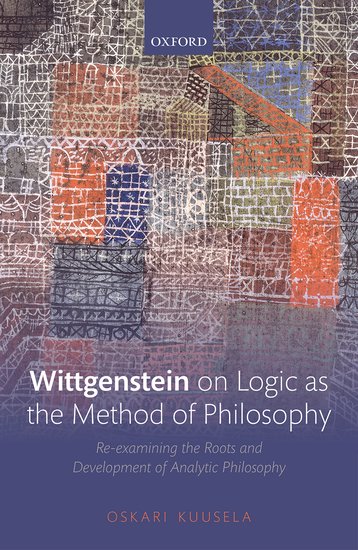Oskari Kuusela is Senior Lecturer in Philosophy at the University of East Anglia. He very kindly found some time in his diary to talk to us about his new book – Wittgenstein on Logic as the Method of Philosophy: Re-examining the Roots and Development of Analytic Philosophy. The book has just been published by Oxford University Press.
Q Oskari Kuusela, many congratulations on the publication of your new book! You have obviously been working on Wittgenstein for a number of years now. In broad terms, could you say a little about what first drew you to his work, and what it is that has sustained your interest in his writings across your career?
Thank you. I discovered Wittgenstein towards the end of my undergraduate studies and got drawn into his work during my Masters back at the University of Helsinki, where there is – or used to be – a strong tradition of Wittgenstein scholarship. Georg Henrik von Wright, who took up Wittgenstein’s professorship in Cambridge after Wittgenstein, was an emeritus professor in Helsinki. He first introduced me, after I had completed my Masters, to Wittgenstein’s manuscripts and other unpublished materials.
Back then some people used to say that to become a philosopher one needs to find a philosopher to philosophise with. I didn’t believe that before it happened to me, and I still don’t know if it’s necessary. But so it went for me. (Whether the philosopher is dead or alive, doesn’t matter. In philosophy we spend a lot of time discussing with dead people.) What aroused my interest in particular was that Wittgenstein seemed to have interesting things to say about issues whose treatment by mainstream analytic philosophers I was dissatisfied with. My focus of interest at the time was especially the philosophy of mind, and Wittgenstein’s writings on that topic were as if from another planet in comparison to the mainstream philosophers such as Jerry Fodor, John Searle, Daniel Dennett, and others, whom I had been studying. (I also studied cognitive science as my minor subject; another important influence on me was Heidegger.) Soon enough I realised that in order to understand what Wittgenstein was saying about the mind, language, linguistic meaning, and so on, I would have to try to understand how he was reconceiving philosophical methodology and rethinking the nature of the discipline itself. That’s an issue that have spent years trying to work out now, and during this process his methodological ideas have become quite integrated into my own thinking. There my engagement with Wittgenstein goes beyond an interest in Wittgenstein’s work as such, because those methodological ideas can be fruitfully applied also to topics that Wittgenstein never discussed or didn’t discuss at any length.
Q That’s very interesting: thank you. How, then, does this new book build on your earlier work? And, could you say a little bit about your motivation for writing this particular book now?
I wrote my DPhil at Oxford on Wittgenstein’s conception of philosophy and philosophical method, and a few years later in 2008 a revised version of that was published as my first Wittgenstein-book by Harvard UP with the title The Struggle against Dogmatism. I saw the book as an attempt to get Wittgenstein out of my system, in order to move on to applying his methods and to address philosophical issues that interested me, especially in moral philosophy. That didn’t quite work out; I couldn’t exorcise him that easily. So, I had to write this second book on his method and philosophy of logic, again with the same hope of freeing myself from Wittgenstein. That’s the background for the new book. (And yes, my next book will be on moral philosophy, not Wittgenstein.) Between the first and latest book I have also edited four collections on Wittgenstein. So in the process I’ve become a well-known Wittgenstein scholar, even famous, some say – weirdly enough for me. I can’t really relate to that. All I’ve tried to do is not to be afraid of difficult questions about how to approach philosophy or how to think about Wittgenstein, not to take received views for granted, and not to deceive myself. If someone finds something useful in my work, that’s great. I wrote the books to work out things for myself, but of course books are also about communication.
What I sought to explain in the first book was what Wittgenstein meant by philosophising without theses, and how this enables one to avoid a certain rigidity and dogmatism in philosophy without sacrificing rigour. In some ways the new book continues these lines of thought. But it also seeks to correct a widespread view that, whilst Wittgenstein was concerned with logic in his so-called early philosophy, this is not so in the later philosophy. By contrast, I argue that in his later philosophy Wittgenstein continues to understand philosophy as a logical investigation, but now logic becomes something quite different that might no longer be recognizable as logic to logicians who identify logic with calculus-based systems and methods. So, the new book seeks to rehabilitate Wittgenstein as a logician. But I also want to suggest that the kind of progress that the founders of analytic philosophy claimed logical methods would make possible could really become possible if we rethink once more our ideas about logic. We need another revolution in logic, following the first revolution by Bertrand Russell and Gottlob Frege in the turn of the 19th and 20th centuries. Through this Fregean-Russellian revolution analytic philosophy was born, but it seems that progress has been less impressive and more controversial than Russell in particular claimed it to be. (Russell said it would be like progress in physics subsequent to the introduction of mathematical methods.) Although quite different, and able to do things that one couldn’t do with a calculus of logic – for example to clarify very complex concepts such as freedom –, the methods introduced by the later Wittgenstein are still logical methods by the old criteria of Russell and Frege with whose work Wittgenstein engaged throughout his life. (These methods include, for instance, the method of language-games that regards language use as embedded in activities and life, and the use of so-called grammatical rules to describe aspects of the use of language.) So, the more serious and ambitious motive for the book is to reconceive analytic philosophy, and help to find in this way towards a new future of philosophy. Relating to this I also discuss some other key figures in analytic philosophy besides Wittgenstein, Frege, and Russell, for example, Rudolf Carnap and Peter Strawson, seeking to clarify Wittgenstein’s contribution to logic, philosophy, and philosophical method by comparing it with the work of these other philosophers. Thus I end up rewriting parts of the history of analytic philosophy with the purpose of finding new paths towards a future, paths that have been covered up by previous and established histories.
Q Wittgenstein on Logic as the Method of Philosophy offers a new interpretation of Wittgenstein’s work and his importance for analytical philosophy. Could you say a little about what this interpretation involves, and how it differs from previous understandings of his writings?
My previous answer already contains some answers to this question: the interpretation of Wittgenstein put forward in the book is an attempt to rethink his philosophy in relation to mainstream analytic philosophy. Wittgenstein has been often seen as a philosopher of language, but I argue that his main concern throughout his career is logic. However, as already said, logic becomes here something quite different from what it is usually thought of. The motive for this new development of logic is the need to be able to clarify and design concepts in terms of which we can try to understand reality without falling into false simplification, and this requires the introduction of new logical methods beyond the calculus-based ones. In a certain sense you could say that philosophy is all about simplifying and idealizing, because this enables one to focus on what is essential rather than accidental, and to achieve rigour and clarity. Except that a lot of philosophy ends up imposing its idealized accounts onto reality in the form of simplistic claims about how things necessarily are. Here Wittgenstein identifies a confusion that relates to how philosophers think about exceptionless necessity that philosophy has traditionally been concerned with. If he’s right, there are no necessary truths, but the function of statements of exceptionless necessity is to be understood differently. (This is a key insight that Wittgenstein holds on to from beginning to end.) How to clarify this confusion and to rethink the function of statements about necessity, which then puts one in a position to deal with complexity without falsification, is perhaps the most important methodological issue discussed in the book. This is not how Wittgenstein is usually read, though. One of the most basic assumptions of the standard interpretations of Wittgenstein is, for example, that he developed a theory of language as a rule-governed practice. But that’s just the kind of falsifying simplification that Wittgenstein can help us avoid. That conception of language can be found in Wittgenstein, but it’s only one model of language among several that he developed. Those models are not to be imposed onto language in the form of a claim about its very nature.
Another novel idea in the book is what I’m calling non-empiricist naturalism, which is a new form of naturalistic thinking that is not a form of empiricism, and which I believe can be found in Wittgenstein, but it hasn’t been quite recognised for what it is. The latter has to do with the failure of Wittgenstein’s readers to see him as continuing and reinventing logic. If this is not kept clearly in focus, his philosophy risks collapsing into some kind of arm chair anthropology the philosophical relevance of which is quite unclear. I suppose this perception of Wittgenstein as an arm chair anthropologist has contributed to his marginalization in contemporary analytic philosophy. So it’s quite important how Wittgenstein distinguishes his investigations from empirical investigations, and replaces Frege’s and Russell’s explanations regarding the difference of philosophy from empirical psychology with a new kind of account. This novel anti-psychologism is then able to take into account empirical facts about humans, human thought and language use, while keeping clear the difference between philosophy and logic, and empirical studies of the same issues.
You could describe the situation like this: analytic philosophers up to the 1970s were quite interested in Wittgenstein before they, or their students, went on to marginalize and dismiss him. What they had figured – metaphorically – was that Wittgenstein had designed an odd an impractical car, arguing that, “Look! That’s clearly a wheel”, “There’s the motor, and up there is the steering wheel”. If you see it like this, Wittgenstein’s design includes all kind of unnecessary odd stuff, like far too many weird meters by the steering wheel, and strange extensions on the side. What they didn’t realize was that Wittgenstein had designed an airplane, not a clumsy and idiosyncratic car. What he had designed has the capacity to move on flat ground like a car, but that is not the point at all. You’re supposed to fly it! It’s of course natural to try to understand new things in light of what one already understands. But the risk is missing out on what is genuinely new. I’m trying to invite people on a flight with Wittgenstein, so they can have a different point of view.
Q You finish the book by reflecting on the debate between ideal and ordinary language approaches. Why is this debate important, and what is involved in your resolution of it?
This is a big unresolved debate relating to logic and philosophical method in analytic philosophy that has been going on since the 1930s or 1940s, and has divided analytic philosophy into two schools. (Not that everyone wants to be part of either school. But these are later developments, some of which seem based on misunderstandings about the aims of those schools.) Whilst the early Wittgenstein is usually associated with the ideal language school that designs idealized logical languages and tries to address philosophical problems by their means, the later Wittgenstein is associated with the ordinary language school. Here the idea is to find solutions to philosophical problems by clarifying concepts by studying their use in everyday language. (The philosophically perhaps most interesting concepts originate in everyday language, for example, goodness, truth, meaning, thinking, language, and so on.) But I think this classification of Wittgenstein is wrong. (The old saying is more accurate that he founded two schools and abandoned both, though I don’t think that quite captures it either.) Recently, ordinary language philosophy has been making some kind of comeback, but these attempts to solve the dispute fall into an old pattern: that of defending one side over the other, and trying to declare one school as the winner. That’s not the approach I take. Rather, the division is to be overcome by recognizing that philosophical methodology needs to combine elements from both approaches. The solution I propose on the basis of Wittgenstein agrees with ordinary language philosophy that it is crucial for solving philosophical problems to recognize the complexity of concepts or phenomena that we’re dealing with, and that in order to clarify our concepts we need to pay attention to their contexts of use. But that this can’t be the whole story is obvious in the fact that if I give you an account of the uses of ‘good’ that is as complex as its actual uses are, this helps you very little, because of the complexity of the account itself. Clarification requires simplification and idealization, because what is simple is easy to understand, and what is complex is difficult or impossible to understand. But if we simplify misleadingly and represent the concepts as being simpler than they are, we get stuck in difficulties again. From this predicament we can find the way out by realizing that simplifications are fine, as long as they capture the features of the objects of study that are relevant for the solution of the problems at hand. But we need to also realize that what is relevant depends on the problems, so that there’s no criterion of relevance independent of that, an absolute one, as it were. What is a relevant feature of the objects of study from the point of view of one set of problems might not be relevant from the point of view of another set of problems and vice versa, and so there is no one point of view that contains everything essential. The completeness of philosophical accounts is relative to the problems they seek to address. This consideration is the key to simplifying without falsification which also puts one in the position to choose the right methods for the right tasks. In this regard it may be unproblematic to employ calculus-based logical methods sometimes and in some areas of thought, like the ideal language school has sought to do. But their mistake is to think that this shows that language or thought really function like logical calculi. This need not be accepted. Rather, a calculus is an idealized means of representing or analysing thought/language, and we shouldn’t impose this idealization on through/language in the guise of an ontological claim about what it really is. Other methods may be needed that recognize complexities that logical calculi can’t do, because logical calculi reduce all thought/language to referring and representation, and turn everything into a subject+predicate or subject+relation with stable identities across their instantiations. This idealization may be useful sometimes, but harmful at others. So, the Wittgensteinian solution leads to a methodological pluralism, where different logical methods can complement one another. On this account neither school emerges as the winner, but both have things to learn from the other.
Q How would you position Wittgenstein in the Western philosophical tradition today? How important is his work for cutting edge debates, but also for newcomers to the field?
Frege made the point that science progresses not only through discovering and establishing facts but through advancement in method. That’s how Frege seems to have seen the importance of his own work, and this is also why I think Wittgenstein is relevant to pretty much any debate in philosophy, and beyond. It’s also important that his methodological pluralism can help us to understand the methodological pluralism in the humanities more widely. It’s not that the humanities, including philosophy, are bad sciences that can’t agree about any facts. In order to satisfy the different needs that inform the study of humanities, and in order to do justice to the complexity of the phenomena they study, we need research frameworks and methods that focus on and are able to handle different aspects of those phenomena. Consequently, what the different approaches in the humanities talk about might not be commensurable in a simple way or reducible into some kind of master-method that gives us a nicely uniform McHumanities. But that’s not a problem, if we understand the situation in the right way. So, in that way I see the relevance of Wittgenstein’s methodological ideas as reaching far beyond philosophy.
But of course Wittgenstein is very much a philosophers’ philosopher, and a hard core one at that. With regard to the philosophical tradition, what philosophers have sought to do might seem quite peculiar or at least it is peculiar if you accept their explanations of what they are doing. Rather than making claims about any empirical regularities, they’re concerned with non-empirical exceptionless necessity, whereby exceptions aren’t just actually absent but inconceivable. In order to explain what they are taking about, since they’re evidently not talking about empirical regularities, philosophers have postulated a variety of strange non-temporal entities and structures that are not part of empirical reality, like Plato’s forms, Kantian and Husserlian transcendental structures of the mind, Heideggerian ontological structures, Russellian logical forms, and so on. Sometimes Wittgensteinian grammar gets added on this list, but I don’t think this is right at all. Wittgenstein has a proposal that can pull all this speculation about weird entities and structures down to earth. Yes, philosophy is concerned with non-empirical necessity and possibility, but when philosophers represent something as necessary or possible they are not making statements about some kind of non-temporal truths or facts that are fundamental to reality. Those necessities and possibilities are features of the philosophers’ modes of representing reality – of their models or theories – which serve as a means to understand the actual, messy and changing empirical reality. One important message here is this: don’t confuse your mode of representing reality with reality itself. Once again we come here to the possibility of methodological pluralism which has nothing to do with relativism about truth. What is true depends on how things are. With the variety of methods we have for studying reality, both in the sciences and in the humanities, we can try to understand how things are, to make truths about reality accessible to ourselves. But philosophers need to watch out for their hubris. It’s an exciting idea that philosophy could lead you to comprehend non-temporal fundamental truths, because that makes you a bit like God, giving you a glimpse of the perspective of immortals. But perhaps it is better to remain sober and recognize our models for what they are, i.e. models designed by people. Indeed, maybe that can even help us be more human towards one another! I can’t remember many examples where humility harmed a philosopher.
As for newcomers, I’ve lectured to students about Wittgenstein, including first year students. I’ve seen how lights can go on, and witnessed some intelligent young people getting excited. It’s great to watch! I think this has to do with how Wittgenstein’s methods can help one to think for oneself, how they bring things down from metaphysical heights, and how they enable one to acknowledge and deal with complexity without it exploding on one’s face. In some ways the excitement is perhaps similar to Sartre’s when he first heard about phenomenology, according to a well-known legend. He was excited because he thought this method would enable him to philosophize about anything, including the cups and bottles on the café table. But with phenomenology you then seem to get stuck with only talking about the processes through which those phenomena are constituted by the mind or acting agents (depending on the style of phenomenology). So in a way regular objects are kept at an arms distance after all. For this and a few other reasons I prefer to go with Wittgenstein.
Q Now that Wittgenstein on Logic as a Method of Philosophy has been published, what are your hopes for the book? What would you like readers to take away from it, and what impact would you like it to have on the world?
I’m a little bit concerned that people might lose sight of the forest for the trees. To make my case about Wittgenstein I have to engage in some serious scholarship. I don’t want to add to the significant amount of literature on Wittgenstein that proposes some way to understand him, but doesn’t really bother to justify it on the basis of what he actually said. There’s too much stuff like that relating to so-called philosophical therapy, for instance. Wittgenstein actually draws an analogy between the multiplicity of philosophical methods and the multiplicity of therapeutic methods once in his main work, the Philosophical Investigations. A handful of other mentions can be found in his writings. But compared to how prevalent the idea of Wittgenstein as some kind of therapist has become, this is totally out of proportion, and I know of no serious attempt to argue for a therapeutic interpretation on the basis of what Wittgenstein actually wrote. I don’t want to contribute to this kind of writing about Wittgenstein which strikes me as sloppy and positively counter-productive for understanding him. (Here we risk just seeing our own reflection on his writings, and of failing to actually learn from him.) But then I’m led to another problem: Wittgenstein is difficult and my book argues for the interpretation in detail, on the basis of his manuscripts, for example. I have no great confidence that people will actually take the trouble of reading the book. That doesn’t matter as such, but I think it’s a pity if the important issues relating to philosophical method and logic that are the real substance of Wittgenstein’s philosophy are ignored. In particular, I’m sceptical that I will reach the audience that I would really like to reach, that is, those analytic philosophers who are not really interested in Wittgenstein and would rather dismiss him. Of course with my proposal to solve the dispute between the ideal and ordinary language schools I’ve also positioned myself conveniently for being shot from both sides. But so it goes in philosophy. There’s safety in taking sides, but if you do take sides you risk falling out of philosophy. People get confused about what matters and focus on winning debates rather than trying to understand the truth. I have the benefit of having come from nowhere, so I feel lucky for already having got this far. That and the Stoic point that the reactions of others are beyond my control are reminders that I use to keep myself focused. It helps me avoid feeling the anxieties and disappointments of the academic world too strongly. Time is short so it’s best not to get distracted.
Oskari Kuusela, thank you very much indeed for your time. Wittgenstein on Logic as a Method of Philosophy has now been published by Oxford University Press.
Thank you!





